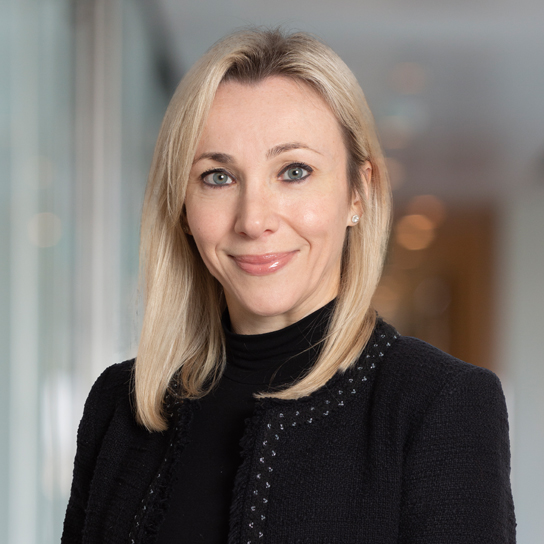News | 21 March 2023
An interview with the Co-Heads of Sustainable Finance and Investment, Hogan Lovells
The intensification of stakeholder focus on sustainable finance and investment is driving change at pace throughout the finance system. Our Co-Heads of Sustainable Finance and Investment, partners Bryony Widdup and Rita Hunter share their insights into this evolving area, including why peer collaboration is key to success and their regulatory wish list.
Firstly, tell us about yourselves and how you came to be involved in Sustainable Finance and Investment (SF&I) work?
Rita: I’m a financial services regulatory lawyer by background and with the introduction of sustainability disclosure regulations, I first began advising banks and asset managers on meeting their obligations under those regulations a few years ago. Since that first foray into the world of sustainable finance and investment, my work has expanded far beyond just the regulations. I’m helping clients with integrating sustainability considerations into their processes, operations and supply chains, and getting involved in innovative projects such as forestry funds and funds for the restoration of ecosystems.
Bryony: My own journey into sustainable finance and investment was slightly different as I’m a finance lawyer by background. I became involved due to the growth of sustainable finance products in the market, advising on sustainability-linked loans and bonds initially. Today, my work has evolved across sustainable financial products more broadly, and includes advising sponsors on pooled investment structures for purpose-driven deployment of capital. We’re exploring alternative impact investing structures, blended finance, and how tokenization and blockchain can advance the climate agenda.
How has the sustainability agenda evolved over the last few years?
Rita: We’ve seen a huge drive towards finding sustainable finance and investment solutions because the demand from investors is very much alive. What might have started out as a government-driven agenda with international treaties such as the Paris Agreement, is now being driven by investors wanting to know their monies are being used to support sustainable activities. Financial institutions have had to respond.
Bryony: That intensification of stakeholder focus in this area is driving real change. We’ve watched as sovereign wealth funds change their policies and pull out of investments not aligned to their ESG goals, arranging to direct their monies elsewhere. On top of that, what was once voluntary or ‘soft law’ is moving into becoming ‘hard law’ as the pace of new regulations coming into force accelerates.
What’s key to the SF&I agenda in 2023?
Bryony: A big focus we’re seeing in 2023 is a shift towards biodiversity first, followed by climate. At the United Nations Biodiversity Conference (COP15) in Montreal, Canada at the end of 2022, a landmark agreement was signed to guide global action on nature through to 2030. The Global Biodiversity Framework features 23 targets to achieve by 2030 and the Taskforce on Nature-related Financial Disclosures (TNFD) is beginning to get teeth in a similar way to the Taskforce for Climate-related Financial Disclosures (TCFD) over the last few years.
Rita: The focus on biodiversity initiatives is filtering down to all organisations and financial institutions. We’re expecting to see more disclosures in this area going forward.
Bryony: A further area is just transition and the focus on emerging markets and climate justice. This focus is going to intensify throughout 2023.
Rita: And we can’t forget the move towards practical implementation of net zero commitments. We’re now helping clients with their annual reports on their net zero commitments and guiding them towards solutions to meet them. We’ve moved from a stage of setting out ambitions to focusing on implementation and the challenges that brings.
Bryony: In the UK, we’ve seen the Transition Plan Taskforce set out a gold standard for climate transition plans to strengthen disclosure standards – this is essential for our financial institutional clients who need to be able to aggregate high quality data for their own reporting. We are looking forward to seeing this improve over the next 12 months or so as it is also an important piece of the puzzle in tackling greenwashing risk, which we have seen rise up the agenda of so many of our institutional clients in recent times.
What role will partnership and collaboration play in achieving sustainability goals?
Bryony: Peer engagement and collaboration are vital on these topics. We’ve seen growth in peers engaging with each other, in appropriate ways in particular via market networks and working groups, to discuss best practice and share common challenges. We have collaborated on industry initiatives globally with the Loan Markets Association, Borsa Italiana, ISDA, GBBC Digital Finance, European Leveraged Finance Association, UN Global Compact and others. With this vantage point, we can see first-hand the huge value these networks are bringing to clients trying to grapple with the practicalities of applying best practice in products and in meeting targets and standards.
How has Hogan Lovells been helping the drive towards net zero?
Rita: We’re helping clients achieve tangible change. By taking stock of their commitments, we’re driving focus on achieving results today, and not putting off change until the future.
Bryony: Our role within the networks mentioned above is also an important part of our work in this space. It’s important that we support across the industries to help find solutions. This is where our pro bono and low bono work is critical. We’re helping small scale innovations scale and become successful for the benefit of the finance system overall.
What’s on your sustainable regulation wish list?
Rita: For me, it’s harmonisation. With different regions having their own sustainable finance disclosure regulations, the situation for cross-border businesses and the clients we work for, is very complicated. There has been a desire to harmonise but so far we haven’t seen regulators following through. Related to harmonisation is clarity, incorporating standards for which disclosures need to be reported against, especially in relation to Scope 3 emissions, would solve much confusion around where to draw the line. Scope 3 reporting is going to have a real impact on the focus of companies and financial institutions’ value chains.
Bryony: I’d like to see a transition taxonomy to properly support transition finance in the near term. Institutional perspectives on being seen to fund initiatives regarded as “brown” as opposed to shades of green, are rightly cautious and potentially appear contrary to stakeholder interests. However, transition for hard-to-abate sectors, including targeted funding for net zero initiatives, improvements that are not necessarily appropriate for “green” categories but are improvements nonetheless, and to tackle issues such as accelerated decommissioning, will be required to move the needle. Transition finance could be the answer to funding and effectively marshalling these necessary projects, it would be great to see this move forward.
Download PDF Back To Listing







